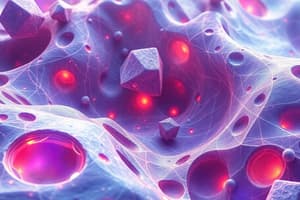Podcast
Questions and Answers
What distinguishes monophasic liquid dosage forms from biphasic forms?
What distinguishes monophasic liquid dosage forms from biphasic forms?
- Monophasic forms are only suitable for oral administration, while biphasic forms can be injected.
- Monophasic forms are made up of a single phase, whereas biphasic forms consist of two distinct layers. (correct)
- Monophasic forms contain solid particles, while biphasic forms do not.
- Monophasic forms have a higher viscosity compared to biphasic forms.
Which of the following is an example of a biphasic liquid dosage form?
Which of the following is an example of a biphasic liquid dosage form?
- Solution
- Syrup
- Suspension
- Emulsion (correct)
In which scenario would a biphasic liquid dosage form be preferred over a monophasic form?
In which scenario would a biphasic liquid dosage form be preferred over a monophasic form?
- When a drug is more soluble in a single liquid.
- When a fast onset of action is required.
- When the active ingredient has poor stability in a single phase. (correct)
- When the formulation needs to be flavored.
Which property is NOT typical of monophasic liquid dosage forms?
Which property is NOT typical of monophasic liquid dosage forms?
Which formulation technique is commonly used in creating biphasic liquid dosage forms?
Which formulation technique is commonly used in creating biphasic liquid dosage forms?
What characteristic is typically associated with monophasic liquid dosage forms?
What characteristic is typically associated with monophasic liquid dosage forms?
Which statement is true regarding the stability of biphasic liquid dosage forms?
Which statement is true regarding the stability of biphasic liquid dosage forms?
Which of the following is a potential challenge when formulating biphasic liquid dosage forms?
Which of the following is a potential challenge when formulating biphasic liquid dosage forms?
In which circumstance would the use of monophasic liquid dosage forms be advantageous?
In which circumstance would the use of monophasic liquid dosage forms be advantageous?
What is a general advantage of biphasic liquid dosage forms over monophasic forms?
What is a general advantage of biphasic liquid dosage forms over monophasic forms?
Flashcards
Monophasic Liquid Dosage Form
Monophasic Liquid Dosage Form
A single-phase liquid preparation, meaning it has a uniform composition throughout.
Biphasic Liquid Dosage Form
Biphasic Liquid Dosage Form
A liquid preparation with two distinct phases, typically a liquid dispersed in another liquid.
Suspension
Suspension
A liquid dosage form containing solid particles dispersed throughout a liquid medium.
Emulsion
Emulsion
Signup and view all the flashcards
Solution
Solution
Signup and view all the flashcards
Syrup
Syrup
Signup and view all the flashcards
Elixirs
Elixirs
Signup and view all the flashcards
Oral solutions
Oral solutions
Signup and view all the flashcards
Injectable solutions
Injectable solutions
Signup and view all the flashcards
Biphasic Liquid
Biphasic Liquid
Signup and view all the flashcards
Monophasic Liquid
Monophasic Liquid
Signup and view all the flashcards
Suspension
Suspension
Signup and view all the flashcards
Emulsion
Emulsion
Signup and view all the flashcards
Solution
Solution
Signup and view all the flashcards
Syrup
Syrup
Signup and view all the flashcards
Elixir
Elixir
Signup and view all the flashcards
Oral Solution
Oral Solution
Signup and view all the flashcards
Injectable Solution
Injectable Solution
Signup and view all the flashcards
Study Notes
Biphasic Liquid Dosage Forms
- Biphasic systems comprise two immiscible liquid phases, typically oil and water.
- These systems often involve a dispersed phase (e.g., oil droplets in water).
- Emulsions are a common example of biphasic systems.
- Emulsions are stabilized using emulsifying agents (surfactants).
- These agents reduce interfacial tension between the two phases, preventing the phases from separating (creaming).
- Emulsion types include oil-in-water (O/W) and water-in-oil (W/O), distinguished by which phase is dispersed.
- O/W emulsions are typically used for oral administration.
- W/O emulsions are more suitable for topical applications.
- Emulsion stability is related to the type of emulsifying agent, the ratio of phases, and the processing methods.
- Factors impacting emulsion stability include temperature, light, and mechanical agitation.
- The appearance and texture of the emulsion can be controlled by adjusting formulations.
- Emulsification can be achieved through mechanical agitation, high-shear mixing, or ultrasonic methods.
- Emulsion preparation involves careful selection of ingredients and processing conditions.
- Examples of biphasic systems include liquid orals and topical creams.
- The stability of biphasic dosage forms is critical to maintaining the efficacy and safety of the medication.
Monophasic Liquid Dosage Forms
- Monophasic systems consist of a single homogeneous liquid phase.
- Solutions are the most common type of monophasic liquid dosage form.
- Solutions involve a solute dissolved in a solvent.
- Solvents in pharmaceutical solutions include water, ethanol, propylene glycol, and others.
- Solutions provide rapid absorption and bioavailability compared to other dosage forms.
- Solubility of the solute in a given solvent depends on various factors, including temperature and the chemical nature of the solute and solvent.
- Concentration of the solute is often expressed in various units (e.g., mg/mL, %w/v, %v/v).
- Solutions can be prepared by dissolving the solute in the solvent, followed by mixing.
- Maintaining solution clarity is crucial, achieved by preventing aggregation or precipitation of the solute.
- Clarity of a solution is an indicator of its quality.
- Pharmaceutical solutions can be administered orally, topically, intravenously, or other routes.
- Sterility is important for parenteral solutions.
- Tonicity plays a crucial role in solutions to be administered intravenously, as it influences cellular function.
- The osmotic pressure of the solution should be similar to that of the body fluids to avoid adverse effects.
- Preservation of solutions against microbial contamination is critical.
- The preparation and stability of solutions require careful consideration of various factors.
- Examples of monophasic liquid dosage forms include syrups, elixirs, and suspensions.
- Syrups contain high concentrations of sugar for increased palatability.
- Elixirs utilize alcohol or other solvents as a vehicle for increasing the solubility of various medications.
- Suspensions contain undissolved particles in a liquid medium. Stabilizing agents are required for suspensions to prevent settling.
- These agents (e.g., suspending agents) help to keep the solid particles dispersed, enhancing the uniformity of the suspension (i.e. preventing sedimentation).
Studying That Suits You
Use AI to generate personalized quizzes and flashcards to suit your learning preferences.




